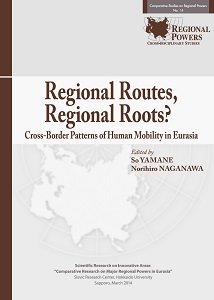Hometowns of the Marwaris, Diasporic Traders in India
Hometowns of the Marwaris, Diasporic Traders in India
Author(s): Sumie Nakatani
Subject(s): National Economy, Economic history
Published by: Hokkaido Slavic-Eurasian Reserarch Center
Keywords: Marwaris; economy of India;
Summary/Abstract: The Marwaris are renowned all over India for having emerged in the nineteenth century as the most prominent group of traders. Under colonial rule they played the role of intermediary traders for the British and facilitated Brit-ain’s commercial expansions. In the early twentieth century they invested in modern industries and some of them became industrial giants. It is estimated that more than half the assets in the modern industrial sector of the Indian economy are controlled by a group of trading castes originating in the northern half of Rajasthan, popularly called the Marwaris. As of 1986, the Birlas, the Singhanias, the Modis, and the Bangurs (all Marwari business houses) ac-counted for one third of the total assets of the top ten business houses in India.
Several studies on the Marwaris have been made. A well-known study by Thomas Timberg focused on the strength of the Marwaris in Indian industry and explored the reason for their disproportionate success. Studying the history of Marwari migrations and the types of economic activities in which they engaged, he discussed what advantages the Marwaris had over other commercial communities in modern industrialization. He suggested that the joint fami-ly system, a credit network across the country, and willingness to speculate were important characteristics. The pos-session of these advantages emerges from their traditional caste vocation in trade. The Marwaris are habituated to credit and risk, and develop institutions and attitudes for coping with them.
In the following sections, I first present ideas about who the Marwaris are, and how they became the most success-ful business group in India. Second, I look at the history of a business town in Shekhawati, focusing on the relation-ship between rulers and merchants. Third, I discuss the Marwari’s investments in their hometowns, especially man-sions constructed with the fortunes they had made abroad. Last, I consider the meaning of ‘homeland’ for diasporic Marwaris.
Book: Regional Routes, Regional Roots? Cross-Border. Patterns of Human Mobility in Eurasia
- Page Range: 63-76
- Page Count: 14
- Publication Year: 2017
- Language: English
- Content File-PDF

